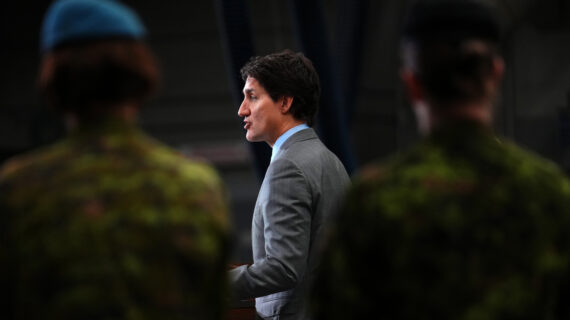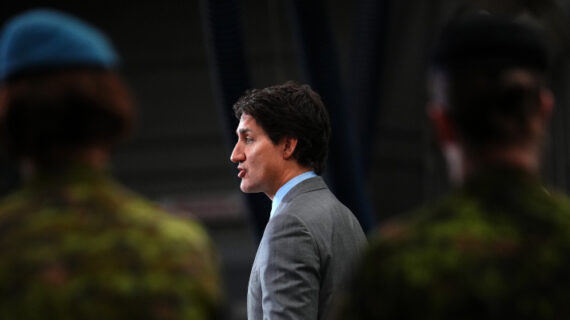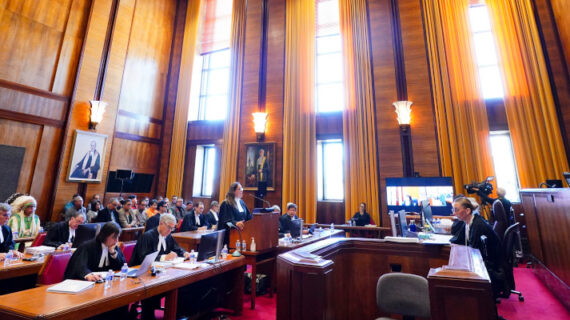- Conservative delegates left the party's policy convention on the weekend in high spirits believing they had broadened the party's appeal to Canadians.
- The mood at the convention was buoyed by several favourable polls showing the Conservatives moving into majority-government territory.
- Former Conservative leader Erin O’Toole was considered to have attempted to move the party in a centrist direction, but B.C. delegate Simon Chandler says that era is over under Poilievre.
Conservative delegates left the party’s policy convention on the weekend believing they had pulled off a difficult trick: moving the party in a more conservative direction while broadening its appeal to Canadians.
Whether or not they truly succeeded won’t be known until the next election but, during voting on resolutions or in the buffet lunch lines, spirits were high throughout the convention.
The mood was buoyed by several favourable polls showing the Conservatives moving into majority-government territory.
Jack Poldrugovac is not surprised the Conservative Party’s popularity soared over the summer.
“I think it’s an honest reflection of public opinion being shown through the party policies,” says Poldrugovac, a party delegate from Ontario. “One of the weird realities of Canadian politics is that despite media depictions, most average Canadians are rather conservative and skeptical of sweeping change.”
Poldrugovac says many news organizations do not acknowledge that reality because it contradicts narratives they want to advance.
Several policy resolutions passed on bread-and-butter issues, such as eliminating the GST on “essential maternity” and “newborn” products, as well as controversial social issues, including motions calling for the prohibition of gender-related surgeries for people under the age of 18.
While many commentators zeroed in on the resolutions passed by the grassroots party delegates, Pierre Poilievre’s speech on the second day of the convention focussed on affordability and restoring the “promise of Canada.” He also touched on cultural issues, like urging English-speaking Canadians to be proud of their history, like Québecers are.
“It’s a great moment for Conservatives to assert that the Liberals have been in power for a long time, and to say that there’s an alternative right now, and a credible one,” says Québec delegate Jean-Francois Trudelle. “A lot of people have seen their credit card account in the last few months and said ‘I’ve done nothing wrong, I’ve been careful with my money, and stuff is still crazy expensive,’ and they know where to put the blame.”
Poilievre was previously criticized by both Liberal supporters and even some Conservatives for not moderating his politics enough to broaden the party’s appeal. However, several polls released over the summer showed a dramatic increase in support for the Conservatives at the expense of the Liberals.
“Canadians are hungry for change, and a conservative change at that. Polls reflect that,” says Poldrugovac. “We don’t want another tepid, basically liberal milquetoast conservative government. Real change is needed, and Pierre Poilievre is that change.”
Former Conservative leaders like Erin O’Toole were considered to have attempted to move the party in a centrist direction to appeal to moderates, but B.C. delegate Simon Chandler says that era is over under Poilievre.
“I think that sort of moderate direction for the Conservative Party has ended, and I think Pierre Poileivre has probably breathed a lot of new life into the party,” says Chandler.
Votes on many social issues, such as the one calling for an end to gender-related surgeries, were noticeably more split than others. While this may reflect disagreements within the party between its more socially liberal members and others, many delegates reasoned that their opposition to the motion was that the matter should be left under provincial jurisdiction.

Trudelle does not believe the party is excluding its more moderate supporters.
“At the end of the day, it’s a family. We do recognize ourselves in the message that Mr. Poilievre is putting forward. I think we’re unified behind that,” says Trudelle.
Chandler says the party’s appeal has broadened to include former supporters of rival parties and younger Canadians.
“We’re obviously seeing a lot of more unsure voters from the Liberal Party or the NDP coming to the Conservatives,” says Chandler. “I’ve never seen so many young voters actually flocking to the Conservative Party. It’s quite something.”
Recent polls have shown that support for the Conservative Party has greatly increased over the past year, with pluralities of Canadians belonging to the Gen-Z and Millennial brackets shifting their support to the party.




